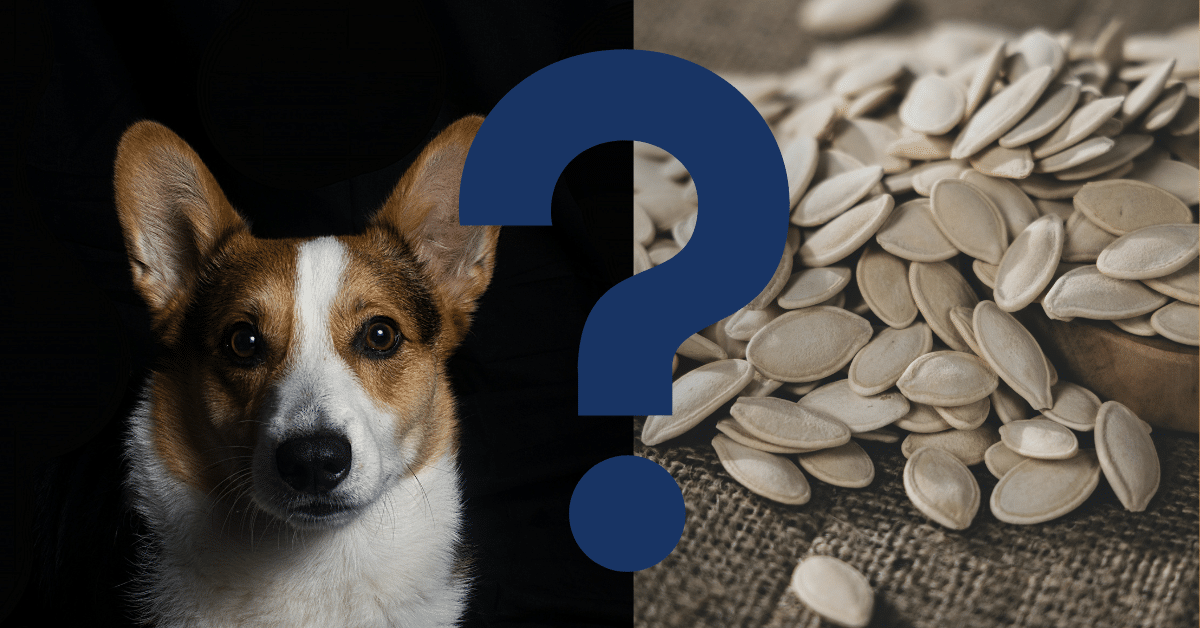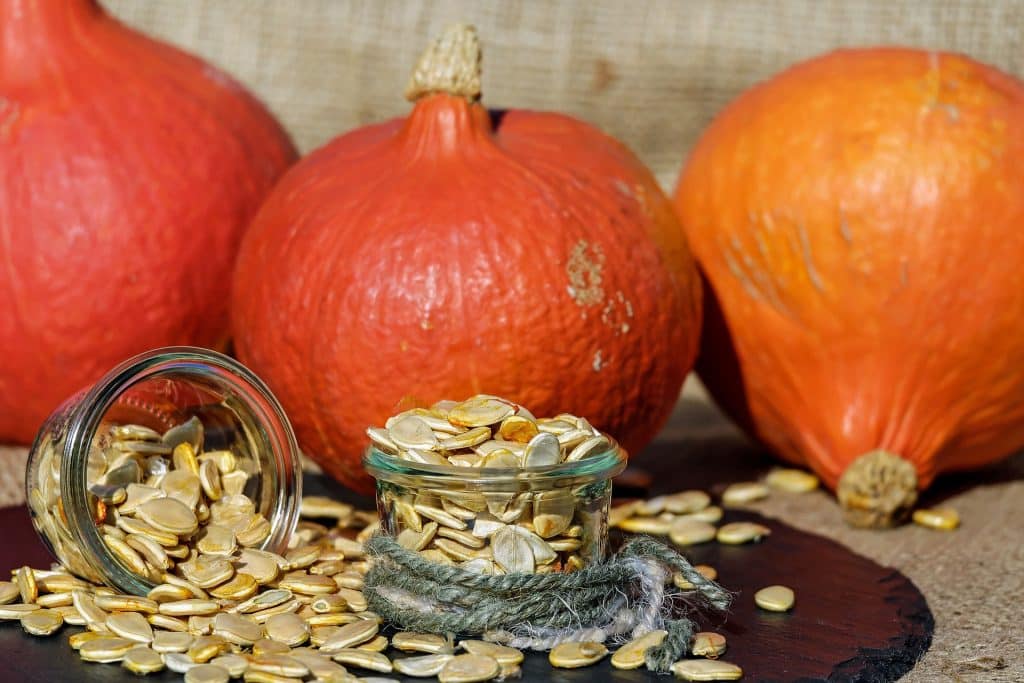Can Dogs Eat Pumpkin Seeds? A Vet’s Opinion

The seeds that sprout inside pumpkins are known as pumpkin seeds. They include many nutrients, including protein, fibre, unsaturated fat, magnesium, and antioxidants, but can you feed pumpkin seeds to your dog?
Yes, dogs can consume pumpkin seeds. The hard shell, which can be difficult for dogs to digest and may result in gastrointestinal problems, is best avoided when feeding them to dogs, and it is preferable to do so in moderation. Dogs can benefit from eating pumpkin seeds as they are rich in fibre, protein, and healthy fats. To make sure a new food is secure and suitable for your particular dog, it is advised to speak with your vet before including it in your dog’s diet.
Benefits Of Pumpkin Seeds For Dogs
Pumpkin seeds can provide several advantages when included in a balanced diet and given to dogs in moderation. The following are some possible advantages of pumpkin seeds for canines:
Nutritional Value
Pumpkin seeds are a great source of protein, fibre, healthy fats, vitamins (including vitamin E), minerals, and healthy fats like omega-3 fatty acids. (such as zinc, magnesium, and potassium). The coat, skin, immune system, and general health of a dog can all be supported by these nutrients.
Digestive Health
Pumpkin seeds’ fibre content can help dogs have a healthy digestive system. Promoting healthy gut flora can help regulate bowel motions, avoid constipation, and support a healthy gut environment.
Urinary Health
Dogs’ urinary health is supported by the natural chemicals found in pumpkin seeds. They might encourage a healthy urinary system and assist in preventing the development of bladder stones.
Dental Health
Chewing on pumpkin seeds can have a moderate abrasive impact that can assist in cleaning a dog’s teeth and gums, encouraging dental health and lowering the risk of dental problems, including plaque and tartar formation.
Antioxidant Qualities
Pumpkin seeds are a good source of antioxidants, including vitamin E, which can assist a dog’s body in fighting off dangerous free radicals. It can enhance general health and lower the risk of chronic diseases.
Weight Management
Pumpkin seeds are a healthy, natural treatment option for dogs, especially those who are overweight or prone to weight gain and are relatively low in calories. They can give a delightful crunch and a source of good fats to a dog’s diet without packing on the calories.
Despite the possible advantages, it’s important to remember that feeding dogs pumpkin seeds in moderation is essential. Many pumpkin seeds, especially those with hard shells, can upset the stomach or be a choking hazard. Always check with your veterinarian to make sure a new food is healthy and suitable for your particular dog before introducing it to the diet. Be aware of portion quantities to prevent overfeeding.

How To Safely Give Pumpkin Seeds To Dogs
Here’s a how-to manual for giving dogs pumpkin seeds safely:
Remove the shell: Dogs may have trouble digesting pumpkin seeds, and the hard shell may be a choking threat. It is best to remove the shells before giving your dog pumpkin seeds. It can be accomplished using a nutcracker to crack the shell or buying shelled pumpkin seeds, also known as pepitas, from a store.
Although it’s not required, you can roast or crush the pumpkin seeds before giving them to your dog. Roasting them can improve their flavour and make them simpler to digest. Spread the pumpkin seeds on a baking sheet and roast them for 10 to 15 minutes at 300 °F or until golden brown. They can also briefly be toasted on the hob in a dry pan. Alternatively, you can powder or paste the pumpkin seeds to add to your dog’s diet, making it more straightforward for them to eat and digest.
Start with a little: When adding pumpkin seeds to your dog’s diet, introduce them gradually to see how they affect him. Depending on your dog’s tolerance and response, you can start with a small amount of whole or ground pumpkin seeds and progressively increase the serving size.
Mix with food: Mixing pumpkin seeds with your dog’s usual food is one of the simplest feeding methods. You can combine the seeds into their usual or homemade dog treats or sprinkle them on their wet or dry meal.
Keep an eye out for adverse reactions: As with any new food, it’s crucial to watch your dog’s reactions. Watch for changes in their stools, gastrointestinal distress, or allergic responses. Stop feeding pumpkin seeds if you notice any problems, and then talk to your veterinarian.
While feeding dogs pumpkin seeds in moderation can benefit them, it’s important to note that. Your dog’s digestive system may become disturbed, or its nutrition may become unbalanced if they consume too many pumpkin seeds. Generally, treats and extras shouldn’t account for more than 10% of your dog’s daily caloric intake
.
Please consult your veterinarian: Before introducing any new food, including pumpkin seeds, to your dog’s diet, it’s usually advisable. Your veterinarian can make tailored suggestions based on your dog’s health requirements, dietary limitations, and potential drug interactions or pre-existing medical issues.
Remember that each dog is unique, so what may be secure and advantageous for one dog may not be appropriate for another. Always put your dog’s health and well-being first, and ask your vet for specific advice before giving your pet pumpkin seeds or any other food.
Will Pumpkin Seeds Make A Dog Sick?
While it’s typically safe for dogs to eat pumpkin seeds, there are a few things to keep in mind to avoid adverse side effects. In the following situations, dogs may experience problems after consuming pumpkin seeds:
Ingestion of the hard shells: Dogs may have trouble digesting pumpkin seeds, and if they consume them in excessive quantities, they may have gastrointestinal distress, including vomiting and diarrhoea. The digestive tract may occasionally suffer damage from the sharp edges of the shells, including injury or obstruction.
Overfeeding: Giving dogs a lot of pumpkin seeds might upset their stomachs and cause an imbalance in their nutrition. As a treat or addition to a balanced diet, pumpkin seeds should be given in moderation as they are high in calories and should help prevent overeating.
Dog allergies to pumpkin seeds are uncommon but possible. Itching, skin rashes, vomiting, diarrhoea, and breathing difficulties indicate an allergic reaction. After swallowing pumpkin seeds, if your dog displays any of these symptoms, stop feeding them and call a vet.
Pre-existing health conditions or medications: Before giving your dog pumpkin seeds or any other new food, it’s essential to consult with your veterinarian to rule out any potential interactions or aggravations of pre-existing conditions, such as allergies or gastrointestinal problems.
Can dogs eat pumpkin seeds variations?
While pumpkin seeds that are plain, roasted, or pulverised can usually be consumed in moderation by dogs without causing harm, it’s necessary to exercise caution when using flavoured or seasoned pumpkin seed varieties. Some flavoured or seasoned pumpkin seeds, like those with salt, spices, or other added components, might not be acceptable or safe for dogs.
Here are some things to think about:
Salt and seasonings: Pumpkin seeds may contain high quantities of sodium, which is bad for dogs if they are flavoured or seasoned with salt, spices, or other seasonings. Dehydration, electrolyte imbalances, and other health problems, such as kidney problems, can result from too much sodium.
Preservatives or additives: Some varieties of pumpkin seeds may include preservatives or additives that pose a risk to canines. These could include synthetic flavours, colours, or other substances that can upset a dog’s stomach or trigger an allergic reaction.
Some pumpkin seed varieties might have additional substances or allergies that are dangerous for dogs. For instance, some flavoured pumpkin seeds might include nuts, seeds, or other potentially allergic or difficult-for-dogs-to-digest substances. Always read the ingredient list and steer clear of any pumpkin seed varieties that include substances known to be harmful to dogs or cause allergies.
Giving them plain, unsalted, and unseasoned pumpkin seeds is recommended if you want to keep your dog safe.

Vet’s Summary
In conclusion, pumpkin seeds can be a healthy and safe treat for dogs when fed in moderation, free of shells, and without adding salt, spices, or other seasonings. However, it is best to avoid pumpkin seed varieties that are flavoured or seasoned and those that contain additives, preservatives, or allergies. Always read and comprehend the ingredient list before giving your dog any pumpkin seed variety, and get the counsel of your veterinarian for specific recommendations.
Additionally, it is advantageous to consider incorporating probiotic pills into your dog’s diet to assist their digestive health. Probiotics are good bacteria that can enhance digestion in dogs and encourage a balanced gut flora. Dog-specific probiotic supplements can be a practical and efficient way to support a healthy digestive tract. However, it’s crucial to speak with your doctor before giving your dog any supplements to identify the right amount and ensure it’s secure and acceptable for your dog’s unique medical requirements.
Videos To Watch
If you are wondering what related foods are good to give your dog, watch this:
And if you want to know what a dog can NOT eat, watch this:






